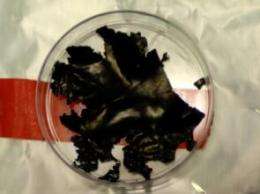March 12, 2009 weblog
Nanoball Batteries Could Charge Electric Cars in 5 Minutes
Lisa Zyga
contributing writer

(PhysOrg.com) -- Researchers at MIT have designed a new battery that can recharge devices about 100 times faster than conventional lithium ion batteries. The design could lead to electric car batteries that charge in 5 minutes (compared with 8 hours in today's electric cars) and cell phone batteries that charge in just 10 seconds.
Byoungwoo Kang and Gerbrand Ceder of MIT have improved the design of a "nanoball battery," which has a cathode that is composed of nanosized balls of lithium iron phosphate. As the battery charges, the nanoballs release lithium ions that travel across an electrolyte to the anode. As the battery discharges, the opposite occurs, and the lithium ions are reabsorbed by the nanoballs in the cathode.
The key to the nanoball battery's quick charge time is the speed at which the lithium iron phosphate nanoballs in the cathode can release and absorb lithium ions. In conventional lithium ion batteries, detaching the ions from the normal cathode takes a relatively long time. By coating each nanoball with a thin layer of lithium phosphate, Kang and Ceder showed that they could detach the lithium ions from the nanoballs even quicker than previous studies have found.
To demonstrate the technology, the researchers fabricated a small battery that could be fully charged or discharged in 10 to 20 seconds, which would otherwise have taken six minutes. The scientists' tests showed that the new material degrades less than other battery materials after repeated charges and discharges. This means that the battery could be made with less material, which could possibly lead to smaller, lighter batteries.
More information: Byoungwoo Kang and Gerbrand Ceder. "Battery materials for ultrafast charging and discharging." Nature 458, 190-193 (12 March 2009), doi:10.1038/nature07853.
© 2009 PhysOrg.com
Written for you by our author Lisa Zyga—this article is the result of careful human work. We rely on readers like you to keep independent science journalism alive. If this reporting matters to you, please consider a donation (especially monthly). You'll get an ad-free account as a thank-you.

















